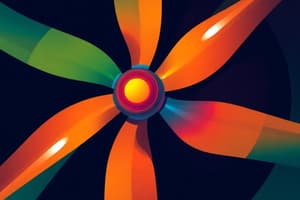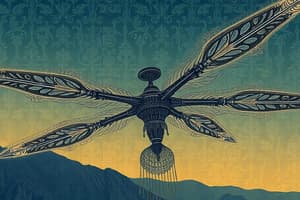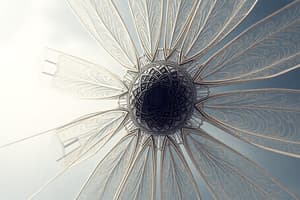Podcast
Questions and Answers
Which rotor blade design has a superior aerodynamic pitch characteristic?
Which rotor blade design has a superior aerodynamic pitch characteristic?
- Tapered
- Asymmetrical
- Parallel
- Symmetrical (correct)
Which blade design is characterized by a higher camber on one side compared to the other?
Which blade design is characterized by a higher camber on one side compared to the other?
- Asymmetrical (correct)
- Symmetrical
- Tapered
- Uniform
How do engineers achieve a similar pitching characteristic with an asymmetrical blade design?
How do engineers achieve a similar pitching characteristic with an asymmetrical blade design?
- By sweeping the edges upwards 3 degrees (correct)
- By decreasing the blade's weight
- By adding a counterweight
- By increasing the blade's surface area
What is the primary reason symmetrical rotor blades are more commonly used?
What is the primary reason symmetrical rotor blades are more commonly used?
Which planform features leading and trailing edges that run parallel to each other?
Which planform features leading and trailing edges that run parallel to each other?
Why do manufacturers prefer the uniform planform for rotor blade production?
Why do manufacturers prefer the uniform planform for rotor blade production?
Which skin configuration is considered easier to repair?
Which skin configuration is considered easier to repair?
When can the chord line mass balance weight on a rotor blade be moved?
When can the chord line mass balance weight on a rotor blade be moved?
What is the primary reason for painting the bottom of rotor blades flat black?
What is the primary reason for painting the bottom of rotor blades flat black?
Which material is NOT typically used in the construction of rotor blades?
Which material is NOT typically used in the construction of rotor blades?
What is the most common method used for inspecting composite rotor blades?
What is the most common method used for inspecting composite rotor blades?
What is the effect of adding weight to the leading edge of a rotor blade?
What is the effect of adding weight to the leading edge of a rotor blade?
What is the purpose of stainless steel capping on the leading edges of rotor blades?
What is the purpose of stainless steel capping on the leading edges of rotor blades?
What type of rotor blades are required to have static discharge capability?
What type of rotor blades are required to have static discharge capability?
Where are chordwise mass balance weights typically located on a rotor blade?
Where are chordwise mass balance weights typically located on a rotor blade?
Which component is rigged first on a helicopter?
Which component is rigged first on a helicopter?
What action is required before connecting the collective and throttle?
What action is required before connecting the collective and throttle?
In what order are the flight controls rigged?
In what order are the flight controls rigged?
What is the primary function of the main servo flap?
What is the primary function of the main servo flap?
Which system is considered more complex?
Which system is considered more complex?
What type of airfoil is a fixed elevator on a helicopter?
What type of airfoil is a fixed elevator on a helicopter?
Which vibration absorbing device uses a weighted drum supported by three springs?
Which vibration absorbing device uses a weighted drum supported by three springs?
What does the correlator do?
What does the correlator do?
How many gradient actuators are present if all flight control systems have force trim?
How many gradient actuators are present if all flight control systems have force trim?
Flashcards
Symmetrical vs. Asymmetrical Blade Designs
Symmetrical vs. Asymmetrical Blade Designs
A symmetrical rotor blade has the same aerodynamic properties on both sides, while an asymmetrical blade has a different shape on each side. Examples are seen in the profile of the blade.
Which blade design has a better aerodynamic pitch characteristic?
Which blade design has a better aerodynamic pitch characteristic?
Symmetrical blades have better aerodynamic pitch characteristics, meaning they are more stable in the air and less prone to tip flutter. This means they need less sweeping to achieve stability.
Which blade design produces greater lift?
Which blade design produces greater lift?
Asymmetrical blades are designed with a higher camber on one side than the other, allowing them to generate greater lift for the same surface area. This is due to the asymmetric airfoil shape.
What is a tapered planform?
What is a tapered planform?
Signup and view all the flashcards
Why are uniform planforms preferred?
Why are uniform planforms preferred?
Signup and view all the flashcards
Why do parallel blades have negative twist?
Why do parallel blades have negative twist?
Signup and view all the flashcards
What are the advantages of bonded construction?
What are the advantages of bonded construction?
Signup and view all the flashcards
Which skin configuration is faster to build?
Which skin configuration is faster to build?
Signup and view all the flashcards
Weight Added Aft of Trim Tabs
Weight Added Aft of Trim Tabs
Signup and view all the flashcards
Rotor Blade Leading Edges
Rotor Blade Leading Edges
Signup and view all the flashcards
Rotor Blade Bottom Paint
Rotor Blade Bottom Paint
Signup and view all the flashcards
Static Discharge on Rotor Blades
Static Discharge on Rotor Blades
Signup and view all the flashcards
Rotor Blade Materials
Rotor Blade Materials
Signup and view all the flashcards
Composite Blade Inspection
Composite Blade Inspection
Signup and view all the flashcards
Rotor Blade Skin Cost
Rotor Blade Skin Cost
Signup and view all the flashcards
Double Plates on Blade
Double Plates on Blade
Signup and view all the flashcards
Rigging the Throttle and Collective
Rigging the Throttle and Collective
Signup and view all the flashcards
Helicopter Testing
Helicopter Testing
Signup and view all the flashcards
Servo Flap
Servo Flap
Signup and view all the flashcards
Main Servo Flap
Main Servo Flap
Signup and view all the flashcards
Flight Control Rigging Order
Flight Control Rigging Order
Signup and view all the flashcards
Droop Compensator
Droop Compensator
Signup and view all the flashcards
Correlator
Correlator
Signup and view all the flashcards
Vibration Absorption Devices
Vibration Absorption Devices
Signup and view all the flashcards
Study Notes
Rotor Blade Design
- Two main designs: symmetrical and asymmetrical
- Symmetrical blades have better aerodynamic pitch characteristics
- Asymmetrical blades provide greater lift for the same surface area, with higher camber on one side
- Engineers use sweeping edges on asymmetrical blades to achieve symmetrical pitching characteristics
- Symmetrical blades are the most common design due to the asymmetrical design's instability
- Two main planform types: parallel (uniform) and tapered
- Uniform planform has parallel leading and trailing edges
- Uniform planform creates greater lift due to its chord line
- Tapered planform has converging leading and trailing edges with decreasing chord length towards the root
- Manufacturers prefer uniform planforms for cost-effectiveness, using one machine stamping for ribs and only one rib part number.
- Tapered planforms need different rib numbers due to varying chord length
- Tapered blades provide more equal lift, accounting for speed variations
- Parallel blades have negative twist for maintaining the same lift at different rotor blade speeds.
Helicopter Skin Configurations
- Single pocket: Quicker to build, but harder to repair if damaged.
- Multi pocket: Easier to repair, but more expensive to build.
Helicopter Construction
- Bonded construction is stronger and eliminates drilling holes
- Multi-pocket skin configuration is easier to repair than single-pocket
Rotor Blade Weights and Balance
- Weight added to the leading edge lowers the helicopter in its plane of rotation.
- Weight added to the trailing edge raises the helicopter in its plane of rotation.
Trim Tabs
- Trim tabs adjust the rotor blades to fly higher or lower in their plane of rotation.
- Trim tab position is adjusted to alter the aerodynamic effect of airflow, for achieving correct pitch changes.
Rotor Blade Material and Color
- Metal, composite, and wood are common materials for rotor blades.
- Rotor blade bottoms are painted flat black to reduce glare for the pilot.
Rigging Procedures
- Rigging occurs before further procedures and ensures removal of all residual hydraulic force.
- Collective is rigged first on a helicopter for all stages of preparation.
Studying That Suits You
Use AI to generate personalized quizzes and flashcards to suit your learning preferences.




